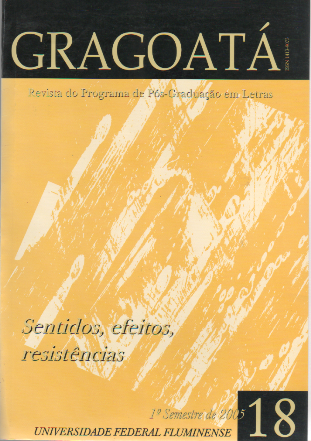A crônica de jornal: da ponta da linha ao fim da picada
Palavras-chave:
crônica brasileira, jornalismo, narrador, leitoresResumo
A representação da realidade brasileira assume várias formas que misturam as narrativas com a subjetividade de cada autor. Para explorar a dialética entre texto e acontecimento em crônicas de jornal, este artigo esboça um panorama breve da crônica brasileira, destaca a relevância de Machado de Assis e registra uma análise inicial das crônicas de Arnaldo Jabor na Folha de S. Paulo e O Estado de S. Paulo. A crônica de jornal moderna, gênero no qual Jabor é um nome importante, aposta em imagens com uma função de "psicanálise social. É uma re-elaboração da herança da "cultura de janela", deixada por João do Rio. Para os leitores, o efeito é a comunhão perfeita: qualquer pessoa pode se sentir "autor" da crônica. Afinal de contas, a perplexidade que o leitor não sabe expressar está lá, engraçada, irônica, analítica e conclusiva. Porém, isso não é o bastante para a formação de uma consciência nacional, porque o leitor não pode exercitar uma própria racionalidade, resultante do fundo trazido pelo texto. Somente Machado de Assis ofereceu para a crônica tal formação de leitores, com noção política, social e filosófica sobre a história da formação social brasileira. Além disso, o valor literário das colunas de Machado (Bons dias! e A Semana) reside na perspicácia da elaboração de um narrador, fornecendo uma unidade inexistente na crônica atual.Downloads
Downloads
Publicado
Edição
Seção
Licença
AUTORIZAÇÃO
Autores que publicam em Gragoatá concordam com os seguintes termos:
Os autores mantêm os direitos e cedem à revista o direito à primeira publicação, simultaneamente submetido a uma licença Creative Commons Atribuição 4.0 Internacional (CC BY 4.0), que permite o compartilhamento por terceiros com a devida menção ao autor e à primeira publicação pela Gragoatá.
Os autores podem entrar em acordos contratuais adicionais e separados para a distribuição não exclusiva da versão publicada da obra (por exemplo, postá-la em um repositório institucional ou publicá-la em um livro), com o reconhecimento de sua publicação inicial na Gragoatá.
A Gragoatá utiliza uma Licença Creative Commons - Atribuição CC BY 4.0 Internacional.











